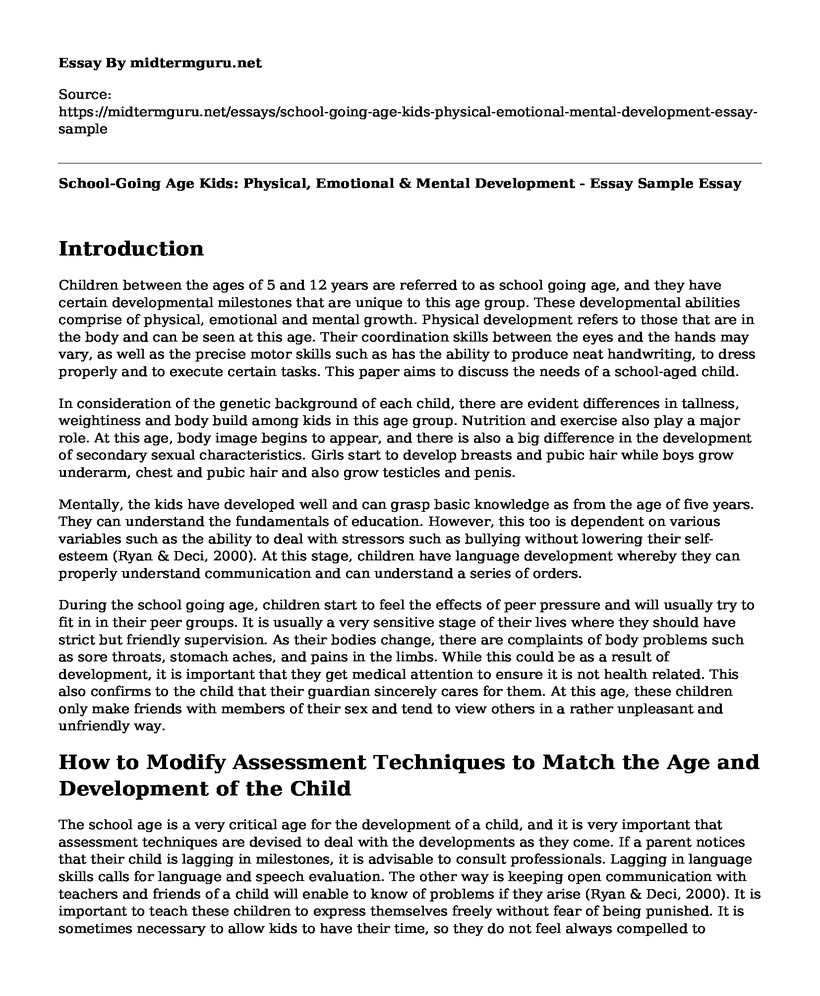Introduction
Children between the ages of 5 and 12 years are referred to as school going age, and they have certain developmental milestones that are unique to this age group. These developmental abilities comprise of physical, emotional and mental growth. Physical development refers to those that are in the body and can be seen at this age. Their coordination skills between the eyes and the hands may vary, as well as the precise motor skills such as has the ability to produce neat handwriting, to dress properly and to execute certain tasks. This paper aims to discuss the needs of a school-aged child.
In consideration of the genetic background of each child, there are evident differences in tallness, weightiness and body build among kids in this age group. Nutrition and exercise also play a major role. At this age, body image begins to appear, and there is also a big difference in the development of secondary sexual characteristics. Girls start to develop breasts and pubic hair while boys grow underarm, chest and pubic hair and also grow testicles and penis.
Mentally, the kids have developed well and can grasp basic knowledge as from the age of five years. They can understand the fundamentals of education. However, this too is dependent on various variables such as the ability to deal with stressors such as bullying without lowering their self-esteem (Ryan & Deci, 2000). At this stage, children have language development whereby they can properly understand communication and can understand a series of orders.
During the school going age, children start to feel the effects of peer pressure and will usually try to fit in in their peer groups. It is usually a very sensitive stage of their lives where they should have strict but friendly supervision. As their bodies change, there are complaints of body problems such as sore throats, stomach aches, and pains in the limbs. While this could be as a result of development, it is important that they get medical attention to ensure it is not health related. This also confirms to the child that their guardian sincerely cares for them. At this age, these children only make friends with members of their sex and tend to view others in a rather unpleasant and unfriendly way.
How to Modify Assessment Techniques to Match the Age and Development of the Child
The school age is a very critical age for the development of a child, and it is very important that assessment techniques are devised to deal with the developments as they come. If a parent notices that their child is lagging in milestones, it is advisable to consult professionals. Lagging in language skills calls for language and speech evaluation. The other way is keeping open communication with teachers and friends of a child will enable to know of problems if they arise (Ryan & Deci, 2000). It is important to teach these children to express themselves freely without fear of being punished. It is sometimes necessary to allow kids to have their time, so they do not feel always compelled to perform. Parents should discuss issues of sexuality, drug abuse, and violence openly with the children since these issues are all over social media. It is important to encourage kids to be physically active to reduce the chances of acquiring lifetime obesity. To cultivate responsibility in children they should be encouraged to participate in family chores.
School-Age According to Erik Erikson’s Development Theory
According to Erik Erikson, psychological development is as a result of exposure to social life span. At the school age according to Erikson, is the stage o industry versus inferiority whereby depending on the kind of social environment that a child has been exposed to, they will either become industrious or inferior. At this stage, a child starts to feel proud of their accomplishments, and when they are praised, they tend to acquire a sense of competence and belief in their capabilities (Berzoff, 2011). The children whose accomplishments are not praised or encouraged tend to doubt their abilities for success. The strategy that can be used to enhance positive growth and development during this stage is praise and encou7ragement which will, in turn, produce pride, self-esteem, and competence.
References
Berzoff, J. (2011). Psychosocial ego development: The theory of Erik Erikson. Inside out and outside in: Psychodynamic clinical theory and psychopathology in contemporary multicultural contexts, 97-118.
Greene, R. R. (2017). Eriksonian theory: A developmental approach to ego mastery. In Human behavior theory and social work practice (pp. 107-136). Routledge.
Ryan, R. M., & Deci, E. L. (2000). Self-determination theory and the facilitation of intrinsic motivation, social development, and well-being. American psychologist, 55(1), 68.
Cite this page
School-Going Age Kids: Physical, Emotional & Mental Development - Essay Sample. (2023, Jan 08). Retrieved from https://midtermguru.com/essays/school-going-age-kids-physical-emotional-mental-development-essay-sample
If you are the original author of this essay and no longer wish to have it published on the midtermguru.com website, please click below to request its removal:
- Essay on Durer Albrechts Self Portrait at 26
- People Who Know They Have a Terminal Illness Should/Should Not Have Children
- Inspiration from The Past - Essay Sample
- The Nature of Psychopathic Personality Revealed by Peter and Val - Essay Sample
- Philosophy, Morals & Future: Exploring Relationships & Beliefs - Essay Sample
- Deborah Tannen: How Language Affects Relationships - Essay Sample
- Nutrient Deficiencies & Eating Disorders: A Biochemical Imbalance? - Essay Sample







